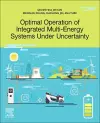
Optimal Operation of Integrated Multi-Energy Systems Under Uncertainty
5 authors - Paperback
£118.00
Qiuwei Wu received the PhD degree in Power System Engineering from Nanyang Technological University, Singapore, in 2009. He was a senior R&D engineer with Vestas Technology R&D Singapore Pte Ltd from Mar. 2008 to Oct. 2009. He has been working at Department of Electrical Engineering, Technical University of Denmark (DTU) since Nov. 2009 (PostDoc Nov. 2009-Oct. 2010, Assistant Professor Nov. 2010-Aug. 2013, Associate Professor since Sept. 2013). He was a visiting scholar at the Department of Industrial Engineering & Operations Research (IEOR), University of California, Berkeley, from Feb. 2012 to May 2012. He was a visiting scholar at the School of Engineering and Applied Sciences, Harvard University from Nov. 2017 – Oct. 2018. His research interests are operation and control of power systems with high penetration of renewables, including wind power modelling and control, active distribution networks, and operation of integrated energy systems. Jin Tan received the M.S. degree from the Department of Electrical Engineering, Wuhan University, Wuhan, China, in 2018. She is working toward the Ph.D. degree in electrical engineering from Technical University of Denmark, Kongens Lyngby, Denmark. Her research interests include the optimal operation of integrated electricity and heating system and renewable energy integration. Currently, she is involved in the project of Using Flexible District Heating with Heat Pumps for Integrated Electricity and Heat Dispatch with Renewables. She focuses on modeling the integrated electricity and heating system, investigating the flexibility that district heating system could provide to the electric power system, and the optimal operation for the integrated electricity and heat system considering wind power uncertainty. Menglin Zhang received the B.S. degree in electrical engineering from Southwest Jiaotong University (SWJTU), Chengdu, China, in 2011, and the Ph.D. degree in electrical engineering from Wuhan University (WHU), Wuhan, China, in 2017. She was with the Department of Electrical Engineering, Huazhong University of Science and Technology (HUST), Wuhan, China from 2017 to 2019. Currently, she is a Post-Doctoral Researcher with the Center for Electric Power and Energy, Technical University of Denmark (DTU). Her current research interests include the modeling of temporal-spatial correlation of renewables in stochastic programming and advanced uncertainty set to reduce conservativeness in robust optimization, the modeling of optimal operation of integrated electricity and heat system considering flexibility, and the accelerated solving algorithm for the bulk system. Xiaolong Jin obtained the Ph.D. degree from the School of Electrical and Information Engineering, Tianjin University, Tianjin, China, in 2019. He is now a Postdoc researcher with Technical University of Denmark (DTU). His research interests include energy management of multi-energy systems and multi-energy buildings. Specifically, his research focuses on improving energy efficiency and reducing operating cost of multi-energy systems and multi-energy buildings with designed energy management frameworks, which uses the flexibilities from three aspects: 1) Use the demand-side flexibility by dispatching the flexible multi-energy loads in smart buildings; 2) Use the network-side flexibility by coordinating the multi-vector energy networks; 3) Use the supply-side flexibility by scheduling the various generations in the energy stations and the distributed energy resources connected with multi-energy systems and multi-energy buildings. Ana Turk received the B.S. degree from the Faculty of Electrical Engineering and Computer Science at University of Maribor in Slovenia and MSc degree in Energy Engineering from Faculty of Engineering and Science at Aalborg University in Denmark in 2018. She is currently pursuing a Ph.D. at the Center of Electric Power and Energy (CEE) at the Department of Electrical Engineering at the Technical University of Denmark (DTU). Her research interest include integration and modeling of multi-energy systems (district heating, natural gas and electric power system), stochastic programming and optimal operation and scheduling of multi-energy systems. In particular, special focus is on optimal operation and real time control of integrated energy systems by using model predictive control.